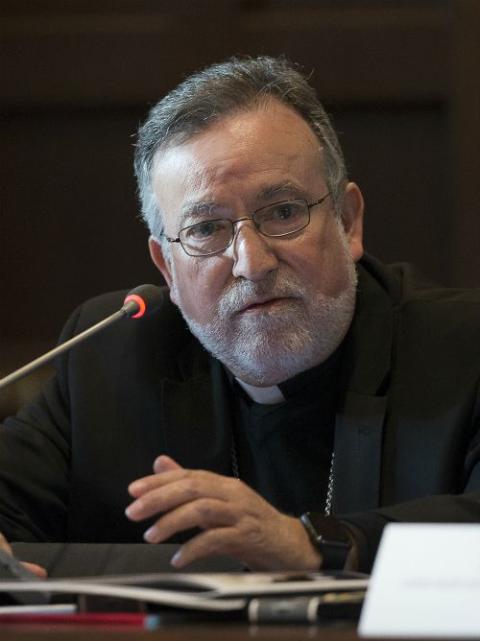
Delegates of the Instituto Pastoral Migratoria workshop are seen at Broadview Jail in Maywood, Illinois, July 13, where people are deported to Mexico. Staff and members of the Archdiocese of Chicago's Pastoral Migratoria (Hispanic Immigrant-to-Immigrant Ministry) trained diocesan, pastoral and lay leaders from across the United States on how to start the immigrant-led ministry for service, justice and accompaniment in parish communities to meet the needs of immigrants. (CNS/Chicago Catholic/Karen Callaway)
Bishop Jaime Soto of Sacramento, California, told participants at the Social Action Summer Institute July 18 that only religious-minded patience can save the world from the horrific headlines of the day.
"The past year has been heart breaking. Our patience has been tested," he said. "Patience is not resignation. It is not abdication."
It is, rather, the biblical practice of Abraham and Moses, St. Paul and the apostles, and others who waited in religious hope, he said to the institute, which brings together church social action directors from around the country. This year's event of the Roundtable Association of Catholic Diocesan Social Action Directors was held at St. Joseph's University here, with the theme "Cultivating Creativity in Social Justice Ministry: 'Love requires a concrete, creative response' - Pope Francis."
Soto cited the concept of religious vigil, such as those protesting executions and abortions, as signs of religious patience, without which, he said, those who are involved in social justice causes can be consumed by anger and hatred. The church's belief in the Incarnation, and its sacramental traditions of using bread, wine and oil, all drawn from the earth and point toward what Soto described as an "evangelical creativity" to address this world's issues.
In Evangelii Gaudium, Pope Francis invoked four pastoral principles: time is greater than space, unity should prevail over conflict, realities are more important than ideas, and the whole is greater than the part.
In his address, Soto said those principles of Catholic action need to be applied in a wide range of issues, including immigration, police and law enforcement, the #MeToo movement, organized labor, marriage, work with veterans, and sex education. Soto, who worked as associate director of Catholic Charities in his home diocese of Orange, California, was active in assisting undocumented immigrants who received amnesty in the Immigration Reform Act of 1986. He became bishop of Sacramento in 2008.
Advertisement
Soto said Catholics applying the church's social teachings need to be involved in issues such as police-community relations. (Sacramento was wracked by protests after the shooting death of Stephon Clark, an unarmed black man, by police earlier this year.)
"Both sides need the church to hear them and help them," he said.
The #MeToo movement upholds the dignity of all those in the workplace, Soto said, while the church should emphasize its traditional support of labor unions.
"Many of the faithful are part of unions. Many are those without labor protections that unions can provide," he said. The Janus vs. AFSCME Supreme Court decision, issued in June, ruled against the right of public sector labor unions to collect "agency fees" (dues) from all employees. That decision, said Soto, is an example of how government and social policy is shifting in favor of individuals at the expense of intermediary institutions such as unions and the church.
The church can be a force in other issues, sometimes overlooked by social justice activists. He said that marriage is increasingly the province of the wealthy, while the poor struggle to maintain families. Veterans, particularly those who are homeless, offer "personal issues and the larger issues of what war does to people and nations."

Bishop Jaime Soto, January 17, 2018 (CNS/Tyler Orsburn)
Much of the work of the church remains with those Francis describes as on the peripheries. Like Jesus, from the outside region of Galilee, Paul, who preached to the Gentiles considered outside the Jewish world's religious concern, and Dorothy Day, who opened up houses of hospitality for the homeless in New York, the church needs to immerse itself in issues that have an impact on those outside the elites of culture and finance.
In a question-and-answer session after his talk, Soto responded to concerns about the Trump administration's immigration policies.
"As a body, the cohesion of the bishops on that issue is very strong," he said, noting that the bishops have upheld immigrant rights even in the face of strong opposition. He said that every bishop gets hate mail on that issue.
In California, the bishops have held meetings with ICE officials in an effort at clarification and understanding.
Later, away from the news cameras, he said the California bishops in those meetings have addressed concerns by pastors and Catholic school principals that churches, schools and hospitals should remain free of immigration enforcement pressures.
"We want them to be clear on that," he told NCR about the purpose of the meetings. The dialogue, he said, has resulted in quicker communication, sometimes quickly dispelling false rumors that continue to run through immigrant communities in the state.
How should priests talk about political and social issues from the pulpit? Carefully but consistently, said Soto. He suggested that civic holidays, such as Independence Day, Memorial Day and Martin Luther King Day, offer opportunities to address issues in a creative way, without sounding heavy-handed.
"As a bishop I encourage my priests to preach on these issues," he said. "But if you wait till an election year, you will do it badly."
[Peter Feuerherd is a correspondent for NCR's Field Hospital series on parish life and is a professor of journalism at St. John's University, New York.]








